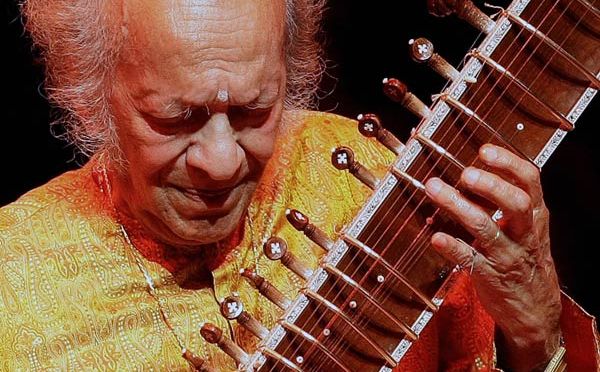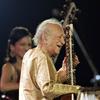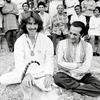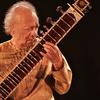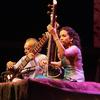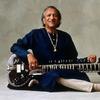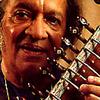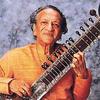Pandit Ravi Shankar, sitar virtuoso and master musician, died December 11, 2012 in San Diego, CA, surrounded by family at the age of 92. He was a global ambassador of India's cultural heritage (and a national treasure), famously collaborating with legends from violinist Yehudi Menuhin and composer Philip Glass to saxophonist John Coltrane, and worked his way into the pop music realm as well, in his efforts to popularize Indian music in the West. His friend and disciple, the late George Harrison, once said that Shankar was the “godfather” of world music. Pandit Ravi Shankar was a repeat guest over the more than 30 years that John Schaefer has been at WNYC, and some of those performances and interviews have been made available below.
#3407: A Remembrance of Ravi Shankar
Wednesday, December 12, 2012
Tonight's show is a remembrance of Ravi Shankar, who died yesterday at the age of 92. Listen to excerpts from his in-studio appearances and live performances, from his first appearance in our New Sounds studios in the 1980's to when he brought his then 15-year old daughter, Anoushka Shankar in 1996. Along the way, Ravi explains his instrument, mentions his association with George Harrison and the hippies, and celebrates every audience as a way of keeping his music new. Also, hear a classic Deutsche Grammophon recording of Raga Gara, and more.
Ravi Shankar: A Sitar Star Remembered
Wednesday, December 12, 2012
Ravi Shankar, legendary sitar master who played alongside The Beatles, John Coltrane and Yehudi Menuhin, died Tuesday at the age of 92. Soundcheck host John Schaefer reflects on the life and music of Shankar.
Listen back to two archival interviews conducted by Schaefer on his program New Sounds -- one from 1984, the other from 1996.
---------------
The first time I met Ravi Shankar, he told the story of the first time he met Baba Allaudin Khan, the man who would become his guru, and later, his father-in-law. Khan began, Shankar recalled, "by rebuking me. He said I was like a butterfly, doing too many things." Shankar was a 15-year old dancer in his brother Uday Shankar's troupe, which in the 1930s first brought Indian music and dance to the West. He also sang, played flute, and sitar -- all by ear. Khan told him that when he was ready to settle down and commit to one thing, he would accept Shankar as a student. It was, he said, a difficult decision, and it took a couple of years, but he eventually committed to the sitar.
Fortunately for us, Ravi Shankar never stopped doing "too many things." While he did become the most famous sitarist and perhaps the most globally-renowned non-Western artist of our time, he also composed film scores, collaborated with leading classical, rock, jazz and traditional Japanese musicians, and even wrote electronic music and played a bit of synthesizer.
"When I play the sitar," Shankar said during one of his many visits to our studio, "I am a purist, orthodox, very traditional. But as a composer I'm not frightened of experimenting with new sounds. It excites me to hear a whole range of instruments."
This was a hard-won wisdom. In the wake of becoming The Beatles "cult guru," to use his phrase, Shankar found himself in a range of unusual settings. Booked into huge rock festivals, he admitted to being discomfited by the sheer volume of the music and the rampant drug use that accompanied much of it. Though he did say he liked The Mamas & The Papas and some of the other, more melodic groups, I got the strong impression that he would not have willingly sat through another Jimi Hendrix set. After Woodstock, when he saw half a million young people "in the mud, and no one in their right mind," Shankar insisted to his overeager managers that he would not do any more rock festivals.
So for much of the 1970s, Shankar kept a relatively low profile, and when he returned in the '80s, he found that the wave of raga-rock excess has crested, and left behind in its wake a much smaller, but still substantial, number of listeners who were genuinely interested in and moved by his music. When he marked his 50th anniversary of performing, he seemed as energized as ever. Every night, he said, meant a different audience, and that kept it new for him.
Shankar passed on his musical genes. His son Shubho passed away in 1992 at the age of 50, but had toured with Ravi and had proven himself a worthy musical companion. His daughters, Anoushka Shankar and singer Norah Jones have each come into their own in the last decade -- Norah of course with a boatload of Grammy Awards and Anoushka as a globetrotting, risk-taking sitarist very much cut from her father's cloth.
And finally, Ravi Shankar taught. You can take that any way you want: He literally taught music to students in school and in private. But he also taught several generations of Westerners to appreciate the beauty and tradition of Indian music. On an even more basic level, he taught us that just because music doesn't come from your culture doesn't mean it can't be yours.
Ravi Shankar, Legendary Sitarist, Dies At 92
Wednesday, December 12, 2012
5 Essential Ravi Shankar Recordings, From 'West Meets East' To 'West Eats Meat'
Wednesday, December 12, 2012
In certain circles, the echoes of the late sitarist and composer Ravi Shankar's talent are everywhere — and not just in the places you might expect.
There's his daughter and sitar protegee Anoushka Shankar, who's followed in her father's fusion footsteps, as well as his daughter ...
#1330: With Ravi & Anoushka Shankar
Thursday, November 07, 1996
In this 1996 show, Pandit Ravi Shankar and his then 15-year old daughter, Anoushka Shankar visited the studio. The Indian sitar maestro discussed the importance of teaching the vocal repertoire so that one might sing on the sitar, and made mention of his new 4-CD retrospective, then just-released. The father-daughter duet also performed an adapted South Indian raga (actually it was performed as a family, with the time kept by Ravi's wife, since there was not a tabla player at the session.)
Ravi Shankar on Around New York (1991)
Wednesday, December 12, 2012

From this 1991 afternoon music and interview show, Ravi Shankar performs in the WNYC Studios and talks with John Schaefer about upcoming projects and concerts.
With Ravi Shankar
Friday, April 12, 1985
Ravi Shankar, Who Brought Eastern Music To Western Legends, Dies
Wednesday, December 12, 2012
#329: Vaults: Ravi Shankar
Tuesday, August 01, 2006
On this New Sounds with a 1989 program, listen to a visit from none other than Ravi Shankar. The sitar master presents music from several different collaborations, explains how to pronounce "raga," and puns on the meat-eating west.
Ravi Shankar, Sitar Master Who Spread Indian Music, Dies at 92
Tuesday, December 11, 2012
Ravi Shankar, the sitar player and composer who became India's most influential musician, died Tuesday evening in San Diego, CA. He was 92.
